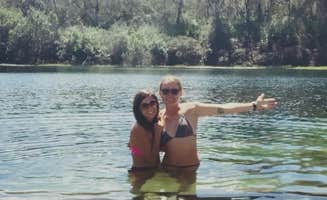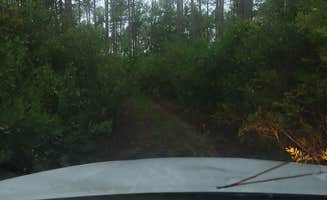Dispersed camping opportunities in the Ocala National Forest provide free camping near Goldenrod, Florida with varying levels of accessibility and seclusion. The forest spans over 600 square miles of pine scrub, sand pine scrub, and flatwoods ecosystems where primitive camping is permitted. Weather conditions range from humid summers with temperatures regularly exceeding 90°F to mild winters with occasional frost, requiring appropriate seasonal preparation.
What to do
Water activities at remote sites: At Freak Creek Dispersed Camping, visitors can enjoy swimming and fishing in the creek. According to one camper, "It's super secluded and quiet. Depending when you stay there's at times people who show up to party and then leave... Great place to put a kayak in the water." The natural waterways provide cooling relief during hot Florida months.
Stargazing opportunities: The St. Johns River Dispersed Spot offers excellent night sky viewing. As one visitor noted, "Right next to the river and the trees open up so you get a great view of the stars." Light pollution is minimal in these remote areas, creating optimal conditions for astronomy enthusiasts.
Wildlife observation: The remote nature of these sites supports diverse wildlife. Forest areas around Freak Creek Dispersed Camping have documented large predator sightings. A visitor mentioned, "I talked to another person that use to go out there and said she has seen a panther." Bringing binoculars and wildlife identification guides enhances these opportunities.
What campers like
Natural water features: Blue Sink offers a remarkable swimming spot for those willing to make the journey. One reviewer described it as the "Most beautiful place to stumble upon," noting its pristine condition and clear waters that stand out among Florida camping destinations.
Solitude and privacy: The secluded nature of these sites appeals to many dispersed campers seeking isolation. At Trout Lake Primitive Sites, the remote location ensures privacy. A camper noted, "Set of primitive spots near lake. Main road entry is packed dirt; smaller access road to sites is two-track about 1/4 mile through woods."
No reservation requirements: The spontaneous access to no-cost camping attracts many visitors. These sites operate on a first-come, first-served basis without reservations or permits. This flexibility allows for impromptu weekend getaways and longer stays without advance planning or booking fees.
What you should know
Vehicle requirements critical: Many dispersed camping areas require specific vehicle capabilities. For Trout Lake Primitive Sites, a reviewer advised, "4WD recommended. Just barely scraped a FWD Promaster through the trees, into a pullout just before sand started." Access roads frequently narrow with limited clearance between trees.
Limited or no cell service: Communication becomes challenging in these remote locations. A Trout Lake camper reported, "Poor cell service even with booster. Plan on returning after antenna upgrade." Visitors should download offline maps and inform others of their planned location and return time.
Safety considerations: Location-specific safety concerns exist throughout the forest. One camper reporting on Lake Dorr warned, "Spoke to a local that warned of violence, robbery, and killings in this area of the national forest." Research current safety conditions before selecting a site.
Tips for camping with families
Choose accessible locations: For family camping, select sites with easier vehicle access. Many primitive sites require challenging navigation that may not be suitable for families with young children or those carrying extensive equipment.
Bring all necessary supplies: No services exist at these primitive sites. Pack adequate drinking water (1 gallon per person per day minimum), food, first aid supplies, and waste disposal bags. Remember toilet paper and hand sanitizer as no restroom facilities exist at these locations.
Plan for variable conditions: Lake Mary Tent Camping and similar sites experience significant weather fluctuations. Summer brings intense heat and mosquitoes, while winter nights can be surprisingly cold. Pack appropriate clothing, shelter, and insect protection for your specific camping dates.
Tips from RVers
Size limitations apply: Most dispersed sites cannot accommodate large RVs or trailers. At Freak Creek, a camper advised, "I would not attempt bringing a camper unless it's really small." Forest roads typically have tight turns, low branches, and soft sand areas that challenge larger vehicles.
Prepare for true boondocking: No hookups, dump stations, or water access exists at these sites. RVers must be fully self-contained with adequate water storage, waste capacity, and power solutions for their entire stay at the South Tower Hunt Camp and similar locations.
Recovery equipment essential: Forest road conditions change seasonally with rain and usage patterns. One Freak Creek visitor warned, "If you don't have 4wd and recovery gear I wouldn't risk it... if you don't you will be stuck until some one comes by." Pack traction boards, shovels, and tow straps regardless of season.



